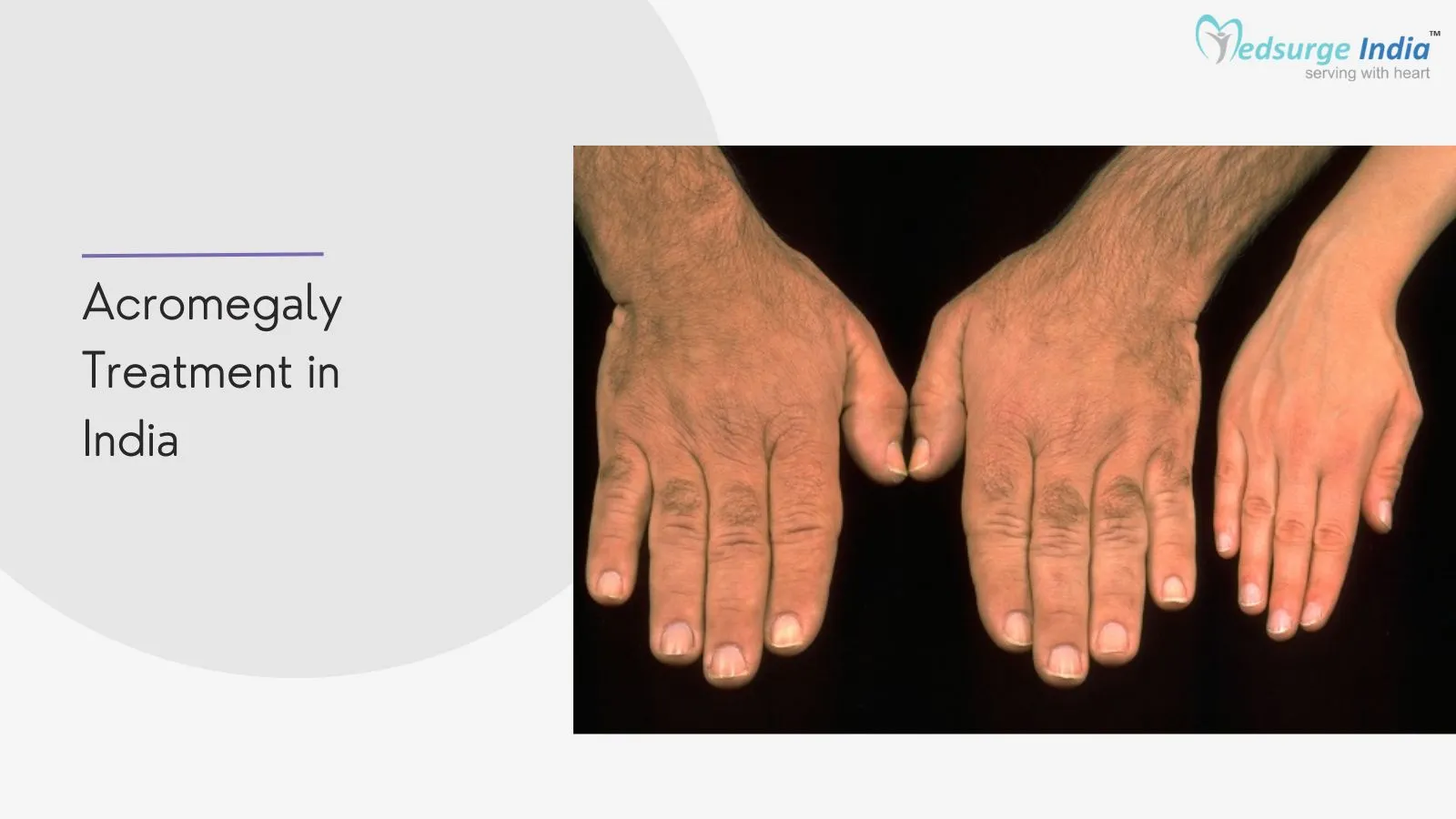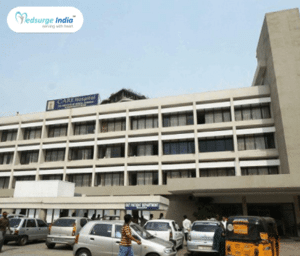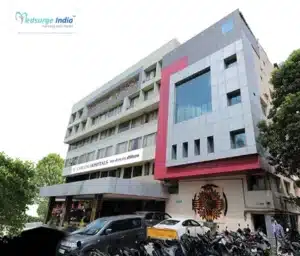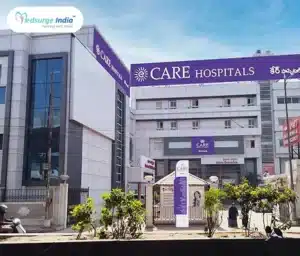Acromegaly Treatment Cost in India
Unlock Exclusive Discount : Your Gateway to Premium Healthcare with Medsurge India Health Value Card.

Unlock Exclusive Discount : Your Gateway to Premium Healthcare with Medsurge India Health Value Card.


Acromegaly is a hormonal condition that occurs when your pituitary gland releases excessive amounts of growth hormone in adulthood.
When you have excessive growth hormone, your bones develop in size. This causes gigantism in children. In adulthood, however, there is no variation in height. Instead, the growth in bone size is limited to the bones of your hands, feet, and face, and is known as “Acromegaly in India”.
When high levels of growth hormone are left untreated, it can impact other sections of the body in addition to your bones. This can result in serious, even life-threatening, health complications. However, Acromegaly Treatment in India may reduce your chance of developing issues and considerably improve your symptoms, including facial enlargement.
Acromegaly is a rare but devastating medical disorder caused by excessive levels of growth hormone (GH) in the body. Acromegaly is caused by tumors on your pituitary gland or in other parts of your body that create excess GH.
The pituitary gland is a small pea-sized endocrine gland observed near the base of the brain, beneath the hypothalamus. Your pituitary gland secretes eight essential hormones, one of which is GH.
Growth hormone, also known as Human Growth Hormone (hGH) and somatotropin, is a natural hormone that promotes growth in children by acting on many different regions of the body. Once your bones’ growth plates (epiphyses) have fused, GH ceases to promote height, but your body still requires it. After you’ve stopped growing, GH helps to maintain proper bone, cartilage, and organ structure and metabolism, including maintaining healthy blood glucose (sugar) levels.
As an adult, having too much GH in your body can cause abnormally shaped bones, enlarged organ size, raised blood sugar levels (hyperglycemia), and other symptoms.
Acromegaly (extra growth hormone) causes bones, cartilage, bodily organs, and other tissues to increase in size in adulthood. Changes in appearance include larger hands, feet, ears, lips, and nose, as well as a more prominent jaw and forehead.
Growth hormone (GH) stimulates the production of another hormone known as insulin-like growth factor 1 (IGF-1). IGF-1 is the hormone that stimulates bone and tissue growth as well as influences how your body handles blood glucose (sugar) and lipids (fats). High GH levels cause high IGF-1 levels, which can lead to Type 2 diabetes, high blood pressure (hypertension), and heart disease.
Acromegaly affects the bones and tissues of adults, causing them to grow in an inconsistent manner.
Signs and Symptoms of Acromegaly in Adulthood are following :
Other signs and symptoms include:
Acromegaly symptoms frequently appear gradually and may be difficult to detect at first. Some people find out their hands have grown in size when rings they habitually wear become too tight or their shoe size, particularly the width, changes.
If you are having the above mentioned symptoms, you should consult with your doctor immediately. Acromegaly usually develops steadily. Even your family members may miss the minor physical changes caused by this condition at first. However, early diagnosis is important so that you can begin receiving adequate care. If untreated, acromegaly can cause major health complications.
The most common Cause of acromegaly is a pituitary adenoma, which causes your pituitary gland to release excessive growth hormone (GH).
The pituitary gland is a small gland situated at the base of your brain, behind your nose bridge. It is responsible for the production of GH as well as a variety of other hormones. GH plays an important role in controlling your physical growth.
Pituitary adenomas (tumors) are usually always noncancerous (harmless). Most adenomas that cause acromegaly grow slowly, and signs of excess GH may not appear for several years.
The adenoma may press against other pituitary tissue and disrupt with other hormones produced by your pituitary gland, depending on its size and location. If the adenoma is large, it may press against surrounding brain areas, causing headaches and vision issues.
Your doctor will ask about your medical history and perform a physical examination. Then he or she may suggest the following measures for the diagnosis of Acromegaly:
If you’ve been diagnosed with acromegaly, your doctor may recommend additional testing to see whether the problem has spread to other parts of your body. Among these tests are:
Affordable Acromegaly Treatment Cost in India starts from INR 4,75,000 (5,700 USD). After the treatment in India, your hospital stay is 4 days and seven days beyond the hospital. Factors that can affect Acromegaly Treatment Cost in India: Based on the size and location of the tumor, a method employed for elimination, the success rate is greater than 95%. Factors Affecting the Cost of Acromegaly Treatment in India are the following:
Depending on the treatment options :
There are various Treatments Available for Acromegaly in India. Your medical professional will evaluate your symptoms and circumstances before recommending treatment alternatives that are appropriate for you. The most common Treatments Options for Acromegaly in India include surgery, medication, and radiation therapy.
Transsphenoidal surgery is a procedure performed to Treat Acromegaly in India. Transsphenoidal Surgery in India is a type of surgery in which the surgeon performs the process via the patient's nose and sphenoid sinus, a hollow space in the skull located below the brain and behind the nasal passages.
The details of the surgical procedure will be determined by the size and location of the tumor. The goal of surgery is to entirely remove a tumor that produces an excessive amount of growth hormone. If your surgeon is able to remove enough of the tumor, you may not need any extra treatment. If the surgeon only removes a piece of the tumor, you may need medication or radiation therapy to suppress the generation of growth hormones.
Your doctor may recommend a single medicine or a group of Acromegaly Treatment Drugs. The various medications work in different ways to keep your body's growth hormone levels normal and minimize your symptoms. In some situations, patients may be advised to take the medications until the tumor has shrunk to the point that the surgeon may safely remove it.
Medical doctors recommend radiation therapy to remove any remaining cancer cells and gradually reduce GH levels. The radiation technique provides three alternative approaches to treat acromegaly, and symptoms may improve gradually over months or even years. Stereotactic radiosurgery, proton beam therapy, and conventional radiation therapy are among the techniques used.
Acromegaly, if left untreated, can lead to the following complications:
The life expectancy of someone with acromegaly is determined by the severity of the disease and whether they have other health problems, which are frequently caused by untreated acromegaly.
Acromegaly is a rare but serious disorder. The good news is that it is curable by surgery, medicine, and/or radiation therapy. It's important to consult your doctor if you've noticed an increase in the size of your hands, feet, or facial features. They can perform a few basic tests to see whether your growth hormone levels are the source of your symptoms. If there are no symptoms of acromegaly and the person is fit and fine despite being taller than average, there is no reason for seeking treatment. Many people have a higher rate of growth hormone secretion, yet there may be no consequences. The individual is then not needed to receive any treatment.
A: Somatostatin analogues (SSAs) are the most commonly used medications to treat acromegaly. These medications inhibit the release of GH and may help to shrink the pituitary tumor. Several studies have proven that these medications are both safe and effective for long-term use.
A: Transsphenoidal pituitary surgery is usually the first-line treatment for acromegaly patients. Patients with larger and more invasive tumors (macroadenomas) are less likely to be in remission after surgery.
A: Acromegaly can be treated with hormone-suppressing medications or radiation to decrease a pituitary tumor, but surgery by neurosurgeons and otolaryngologists (ENT) is the first-line treatment. Acromegaly is usually cured by removing the pituitary tumor.
A: Gigantism, also called pediatric acromegaly and pituitary gigantism, is a very rare condition that happens when a child or adolescent has high levels of growth hormone (GH) in their body, which causes them to grow very tall.
A: The initial step in diagnosing acromegaly is biochemical screening. To diagnose and rule out acromegaly, Endocrine Society guidelines and expert consensus propose utilizing age- and sex-adjusted IGF-1 values in conjunction with GH nadir during an oral glucose tolerance test (OGTT).

Endocrinologist
Senior Consultant
27+ years of experience
Manipal Hospital, Mandi Mohalla, Mysore
View Doctor
Endocrinologist
16+ years of experience
KMC Hospital, Hampankatta, Mangaluru
View Doctor
Endocrinologist
Senior Consultant
11+ years of experience
NH Rabindranath Tagore International Institute of Cardiac Sciences, Kolkata
View Doctor
Endocrinologist
Senior Consultant
15+ years of experience
NH Rabindranath Tagore International Institute of Cardiac Sciences, Kolkata
View Doctor
Endocrinologist
Senior Consultant
25+ years of experience
NH Rabindranath Tagore International Institute of Cardiac Sciences, Kolkata
View Doctor
Endocrinologist
Senior Consultant
14+ years of experience
Narayana Superspeciality Hospital, Shibpur, Howrah
View Doctor
Endocrinologist
Senior Consultant
21+ years of experience
NH Rabindranath Tagore International Institute of Cardiac Sciences, Kolkata
View Doctor
Endocrinologist
Senior Consultant
35+ years of experience
NH MMI Narayana Superspeciality Hospital, Lalpur, Raipur
View Doctor
Endocrinologist
Senior Consultant
15+ years of experience
Narayana Multispeciality Hospital, Rakhial, Ahmedabad
View Doctor
Endocrinologist
22+ years of experience
Max Super Speciality Hospital Bathinda
View Doctor









By using our site, you agree to our Terms and Conditions, Privacy Policy and Refund Policy. Medsurge India provides reliable healthcare information and treatment options to support informed decision-making. Our content is designed to support and complement the guidance of your treating doctor, helping you feel informed and confident throughout your healthcare journey. We also Accept International Payments.

Copyright © 2025 NSM ONLINE SOLUTIONS PRIVATE LIMITED. All rights reserved.